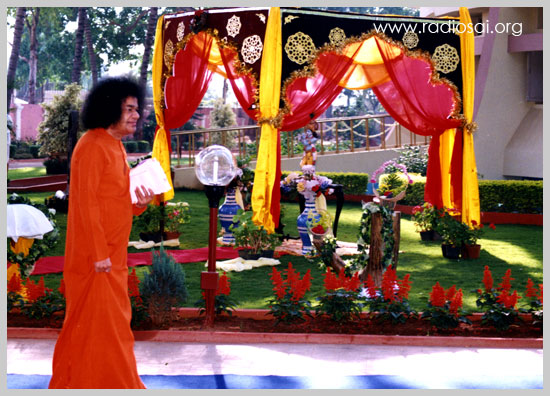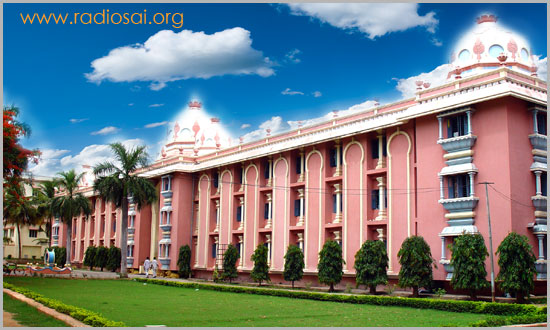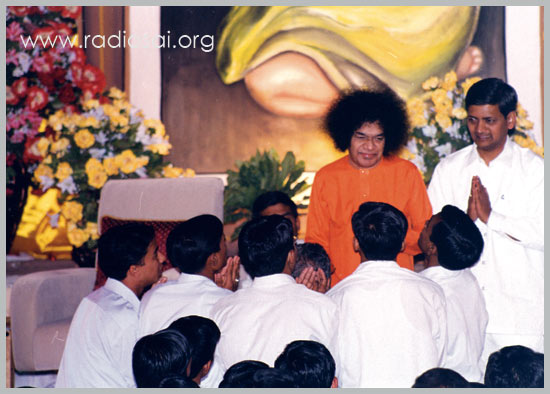| Follow us: |
Posted on : Jan 10, 2012
'THE ONE FORCE THAT PROPELLED ME TO DO THE RIGHT THING'
- Conversation with Mr. Vivek Naidu, an alumnus of SSSIHL
Part 2
His Reassuring Love in the Tempest Around
RS: What were your best moments during your stay in Brindavan?
VN: Brindavan was a turbulent period for me in my personal life.
RS: Because you were adjusting to the new environment?
VN: Adjusting… I was done with it after I had Swami's darshan. I'm the kind of person who just needs to make up his mind. So not from an institution's point of view, not from Swami's point of view, but what was happening in my personal life. It was an incredibly difficult period in family life. Things were falling apart back home. Somehow I feel that my being at Swami's lotus feet is what held my family together.
There were times when my father fell ill and I was extremely concerned. I told, “Swami, father needs operation.” He said, “Sickness is like passing clouds. If you have a body, they'll come, no operation required. Don't worry.” And then, when my dad went later, he didn't require the operation.
 |
I started realizing that there is somebody who will always look out for you and not just for you, He'll look out for your own family and the people who matter to you.
I learnt my first alphabet from Swami. That was in 1982. Back then, you were allowed to sit with a slate and a piece of chalk and Swami would come around. I eagerly put my slate forward, Swami took my slate, and I learned my first alphabet from Him.
Then I came back in 1995, 13 years after that. And though I had no connection with Swami in the intermediate period, much later I discovered that there were many instances during this period, when Swami saved me from pitfalls.
RS: He was always there. You didn't know, probably.
VN: Yes. As a teenager in a very westernized school, I was saved from a lot of bad things, not because I figured out that they were wrong but because Swami's hand was always there, protecting me and taking me away from things that I should not be indulging in.
RS: So from Brindavan, you moved to Puttaparthi for your management course?
VN: I was so involved in being with Swami and I didn't want to go away. And when it came to joining for MBA, we had to appear for an entrance exam and given the competition, there was no guarantee you'll get in. So back then I gave Ganesha a hard time.
RS: Ha ha, okay.
VN: A lot of us believed that the Ganesha (in Prasanthi Nilayam, at the entrance) is very kind. So I gave him a hard time by making Him solely responsible for my MBA seat. I said, “I'll be very cross with you if I didn't get my MBA”, because I just couldn't stand going away from Swami, because that period of three years in Brindavan was heaven and hell.
Life outside was tough, but it was heaven for me because I was in Brindavan. About the value that Brindavan has added to my life, I could probably write a book; perhaps a couple of volumes, of how it actually held my family together, how it changed me as a person, and how I became close to Swami.
After I got into MBA, one day Swami told me, “You have to go home.” That's all He said. MBA admissions in our university depend on our B. Com. (or the corresponding U.G. course) results. But these results are released after the MBA course starts.
So when my result came, I saw that I had failed in Company Law. Now that was the course, I was strongest at and had cleared it with 'O' grades (distinction) throughout. But in my final course, I'd failed that subject. Extremely dejected, I went back home.
RS: Even though you had got the MBA seat?
 |
VN: Yes, I had to go home; one because Swami asked me to and secondly I'd failed the course. I had to reappear for the exam. When I went back home, I discovered that, at that particular time I was incredibly required at home.
My presence there in time would change the life of my parents forever. My physically being there protected my parents from a lot of forces that were working around them. They were getting into a couple of projects which eventually landed us in court. And I was 21 years old back then. I represented the family at the Madras High court.
We had clearly violated the law in putting up a couple of buildings. We faced the prospect of losing an incredible amount of money and respect, because there was no way the court was going to rule in our favour. People who advised my father mislead him and doom was looming around the corner.
Our case number was 18 and there was a similar violation case number 17 and that judge had turned down all petitions for stay. When our case came up, somebody came and said the public pleader who was working on behalf of the government was wanted in another court and he had to leave. And when our case was put forth there was nobody to argue against our case and we got a stay.
Nobody else could have done it; Swami saved us that day. He taught our family a lot of lessons on that occasion. Swami is always very particular about being truthful and law abiding, and that was a big lesson He gave us.
And then, my father suggested that I go to some other college to do my MBA. I said, “How many ever years it takes, I'll only go to Swami's college to do my MBA; I'll go nowhere else.” I eventually got into MBA the next year.
The Lessons Learnt in Swami's Hostels are Lessons for Life
Those were beautiful years! Like I said before, ours is a system where everybody looks after everybody else.
RS: I always remember the saying in the hostel, “A home is a place where each one lives for the other and all live for God.” That's how the hostel is.
 |
VN: Our hostel doesn't have organized workforce; we do not have electricians, plumbers, sweepers, and cleaners. The boys do everything. They run the hostel.
A lot of people who are our professors and lecturers in our college, were former students of our university, who decided to spend the rest of their lives devoted to Swami, teaching in the college by day and running the hostel after college hours. A very unique concept where it teaches you self-sufficiency. It shows you the value of labour and that no job is too small to do.
I was part of the maintenance department (that was responsible for the upkeep of the hostel and involves electrical works, plumbing, carpentry, etc.).
We made our own sets for the dramas, we ourselves did everything required for the Annual Sports Meet; we never relied on anybody outside. Whatever it was, we figured it out. And I think that's a real strength; an incredible quality that Swami has instilled in us. Because when we go out into the world, more than the immense intellectual capital that education gives, it is this attitude that is extremely important. And that's what differentiates us from people who go to other institutions that are not like ours.
I've seen people of great intellectual talent falter when it comes to critical and extremely emotionally demanding situations. If it were intellectually demanding, they can handle it, but if it were demanding in any other way, in terms of having to make a sacrifice, they faltered.
The Challenges and Satisfaction of Living a Principled Professional Life
In my professional career, so far I have managed a portfolio of 200 million US dollars with about 10 to 15 people reporting to me. There is chaos in the financial world and within the country as well. I'm going to talk for myself and not about everybody else. When trouble hit our shores, I had clients who were completely dependent on the export market.
RS: You're talking about the Wall Street Collapse (in 2009)?
VN: Yes, the global recession. I had clients whose sales were dropping 70%. Usually when the world shakes, in terms of commerce and economics, you can sail through it as long as the financial system is intact. But this was one of the unique situations where the lifeblood system—the heart and the nervous system—was shaken up. So you've got to choose—are you going to save yourself as a bank or are you going to save the clients?
And that's a difficult choice to make. The obvious choice for most people is you save yourself first. But I can tell you, in the last one year, I've never allowed any of my clients to fail. I work for a multinational and the survival of this company was in question. There was a lot of pressure; we were told, “We don't care what happens, bring the money back” and we said, “Sorry, we can't do that.”
At one point in time, the company's view is that the automotive industry is ‘the industry’ and that is what you should lend to. And suddenly, you turn around and say that's the industry you should not be lending to. You cannot subject your clients to that kind of drastic change in stance. You cannot put their lives at risk, because one client will have 500 families dependent on them. You just can't pull a plug in self-interest; I didn't want to do that.
RS: You were very clear with that?
 |
 |
 |
VN: Very very clear. It's because again, in the hostel, you were taught to care about the last person in the line. Irrespective of my position in a bank—handling a large portfolio, having a huge title, perceived to be extremely educated—I was worried about the last guy in the production line of my client.
If I pulled out financial support from my client and all of a sudden asked for my money back, certainly my client would have to shut down and somebody is going to go out of work. And that's just not tolerable for us. Swami doesn't teach us that.
The problem with the world today is that you worry about the first person in the line. I'm sure they can take care of themselves. The people we should be worried about are the people who stand last in the line. That is what the life in Sathya Sai institutes and the hostel teach us to do.
RS: That's the definition that Swami gives of JOY — ‘Jesus first, others next, you last’.
VN: Yes. But there are pressures. At the end of the day, if somebody has given me a job, I've got to deliver. So I went about getting finance for my clients from other banks. I went, sat down, and explained.
RS: So you found out alternate ways to help them?
VN: Yes. We have credibility in the market. So we explained to other banks that we are pulling out not because the client is bad; they are extremely genuinely good people. We explained to them that we are in this unique position where our situation is really bad.
It took a long time; in some cases, it took us a whole year to find alternative finance. And that one year, the one person who gave me the strength to believe in what I was doing was Swami.
In the last one year, I've recovered Rs. 100 crores and in dollar terms, that's close to $25 million. And that's a lot of money just from one location. But it's extremely satisfying at the end of the year that you haven't hurt anybody's life, you haven't put other people to hardship. As it is, greed has put a lot of people through this mess.
Swami's teachings are something that you want to practice in your own way. Swami says, “Help ever, Hurt never” and I genuinely would not hurt anybody just because of my work and I would always want to help.
 |
Like I said, if there was one person, one force which made me believe what I'm doing is right, it was Swami.
A lot of people in the bank I work for told me that I took exceptional risk. They said, “Why would you want to take so much on your head? What will happen if something went wrong?”
I told them, “You won't understand. First of all, nothing will go wrong and even if it did, there is Somebody who will figure it out for me.”
RS: We have that self-confidence. Once you build that relationship with Swami, you have that self-confidence.
VN: Yes. Because if you say, “Swami, I am in trouble”, He will never ever fail you. Your life here teaches you a lot of things which confirm that faith.
As long as you care for the person who's last in the line, somebody's going to care for you. It's just a circle. So as long as we start caring for each other in a very real way, I think the world will be a much better place. I don't think I could have got this anywhere else.
RS: Swami has actually laid down the entire routine in the hostel. And listening from you, nine years after you have graduated, one can see the big picture. Everything that Swami does has so much purpose in it. And this model of educational institutions that Swami has set up is so different.
VN: Yes. He's set the ball in motion and I think His own students will have a profound influence on the world. The world is rapidly changing. In one way, I think the Sai way of life is what is going to save the world.
The problem in the financial world today is greed. Sometime back there was a finance conference ('Ethics and the World of Finance' in August 2009) in Prasanthi Nilayam. Swami spoke about a character from the Mahabharata and said he was a good king, but he used to gamble. And the captains of the banking industry were there.
RS: Yes, He started the discourse with that.
VN: Yes. And I think a lot of people understood what Swami said — “Maybe you're good people, but the problem is you gamble.” And that is the issue in the financial world today. There is just too much gambling going on. I believe a lot of our students, our alumni are going to take very senior roles and it will redefine the world. You just have to wait to see that happen.
RS: Absolutely! One only feels more encouraged when one listens to people like you! I hope we will have more such sessions with you in Radio Sai. Thank you so much.
VN: It's been my pleasure. Thank you very much.
- Radio Sai Team






